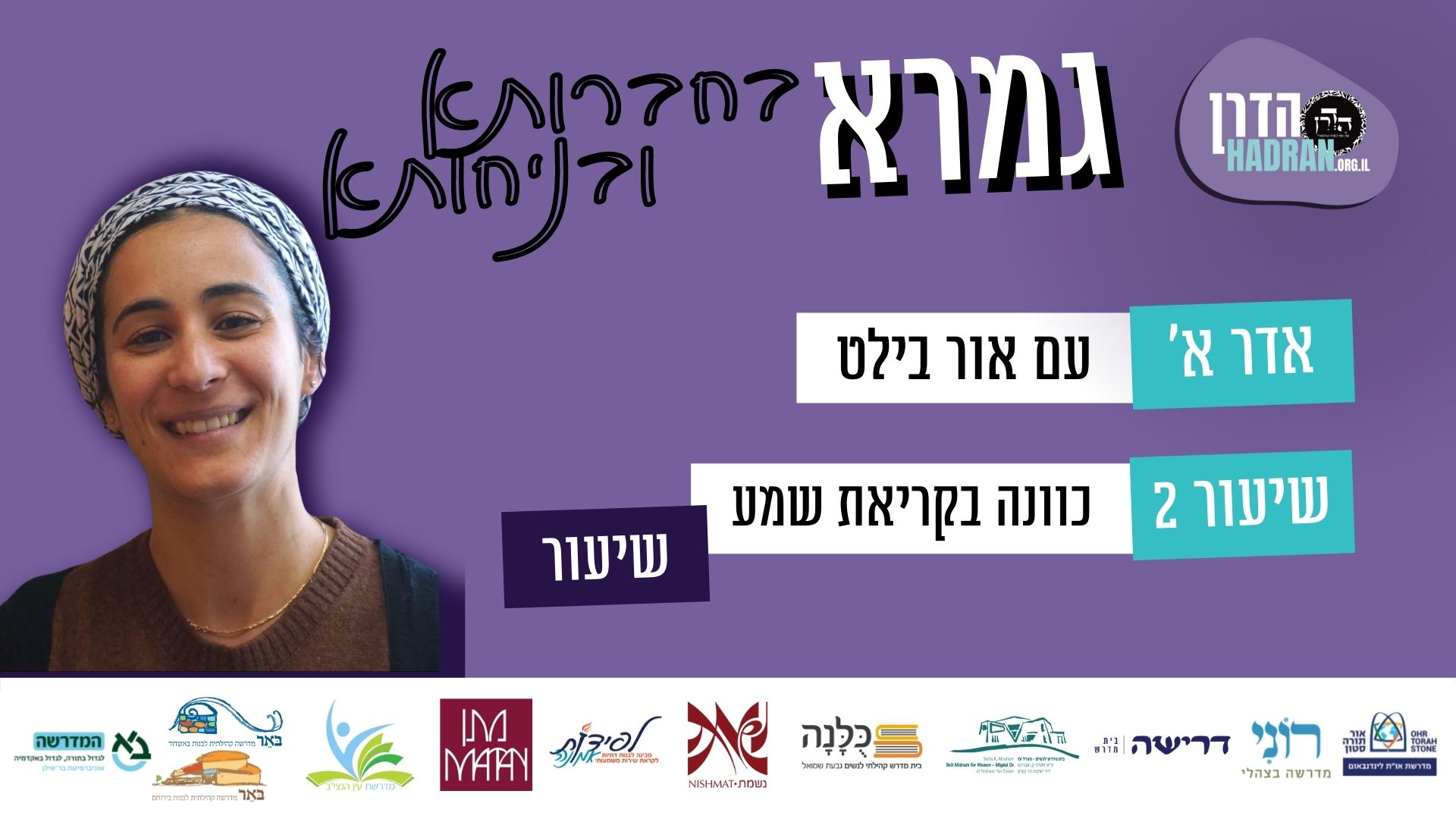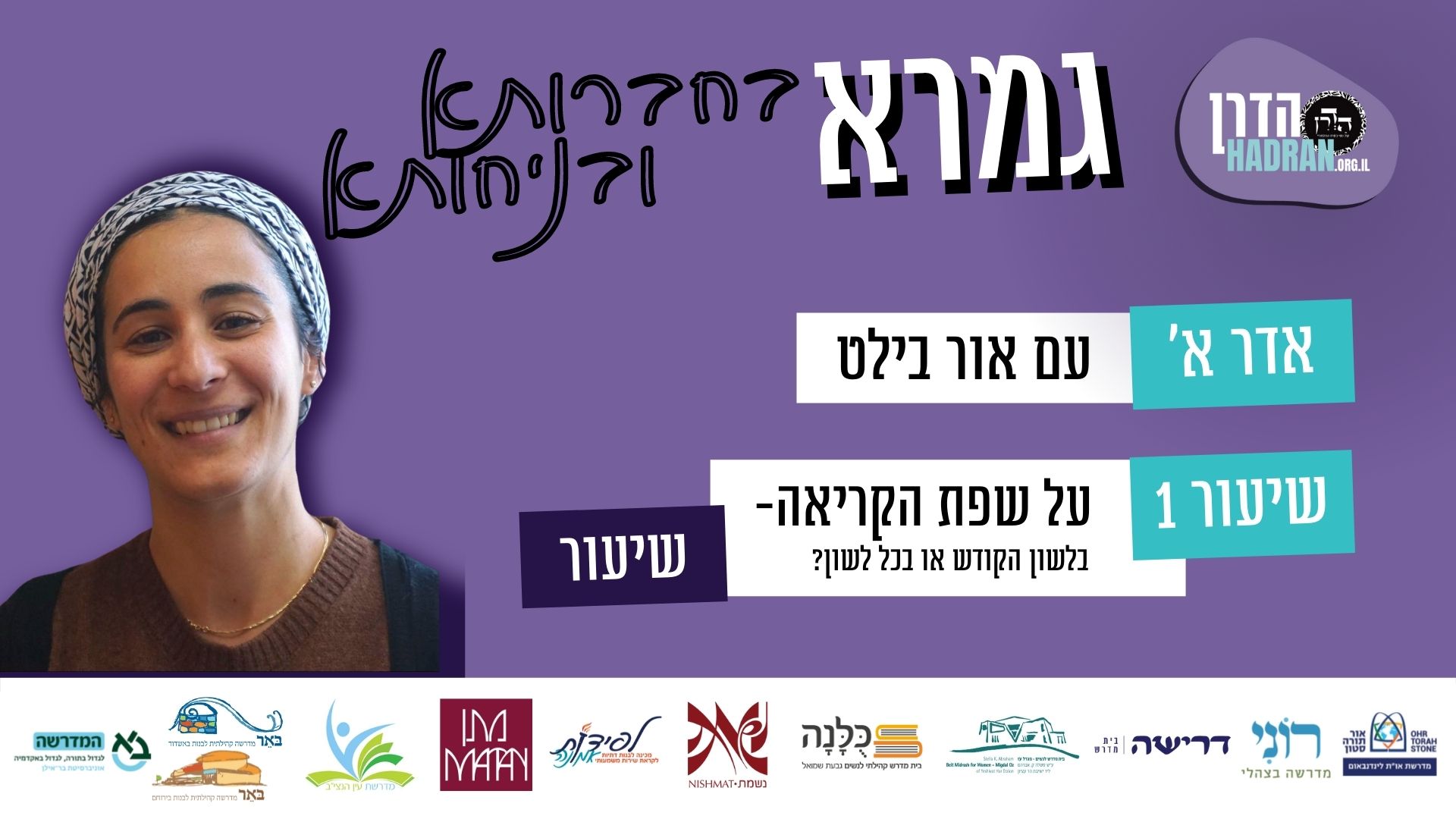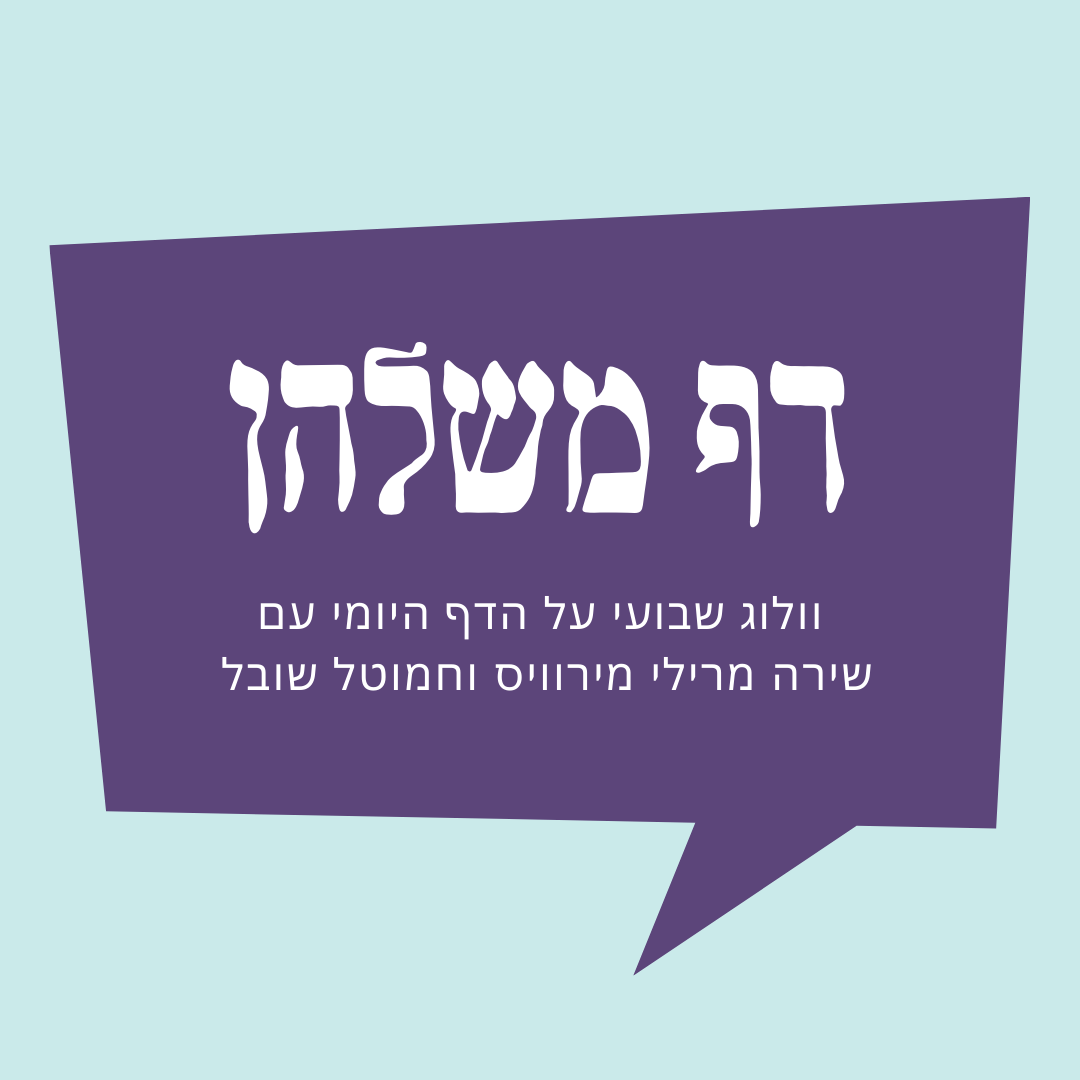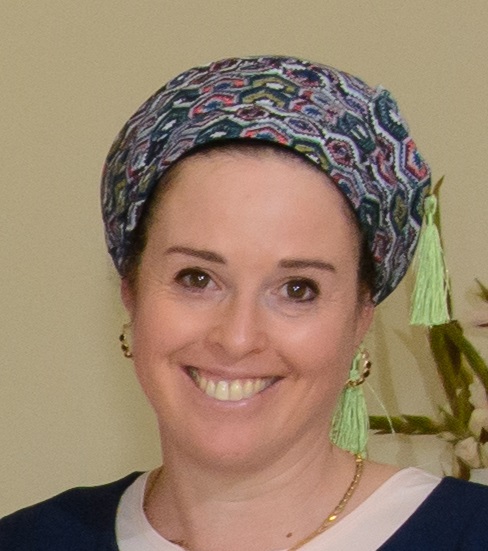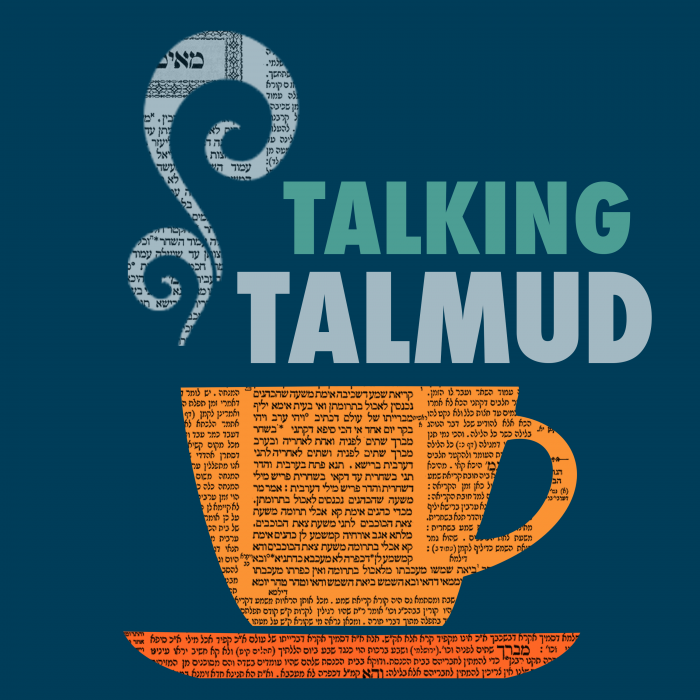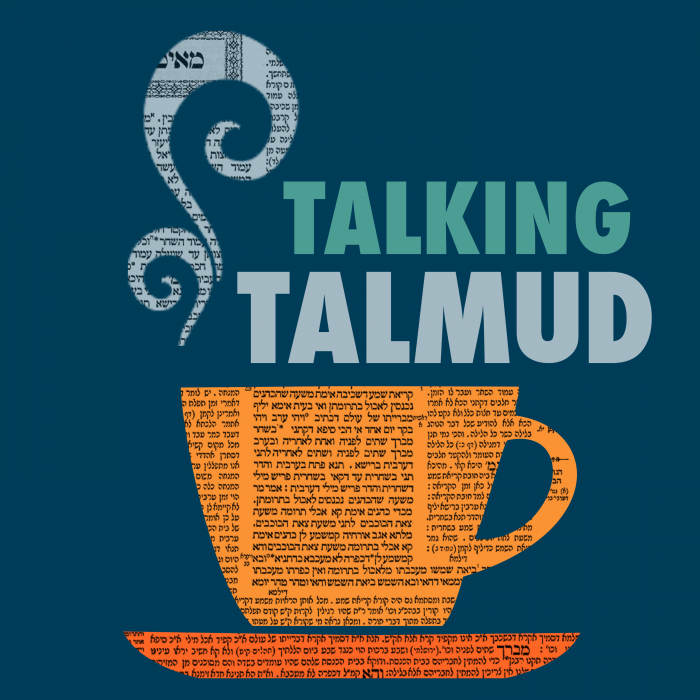האם אפשר לקבוע סעודה על יין אם מסיבים – כך שאפשר להוציא ידי חובה מישהו אחר בברכתו/ה? יש מחלקות רב ור’ יוחנן אבל יש גם שתי דרכים להבין את המחלוקת. מה ההבדל בין יין בתוך או אחרי הסעודה? למה בתוך הסעודה אי אפשר להוציא אחרים ידי חובה? אם אחד מברך לאחר הסעודה על היין לאחרים, יש לו גם את הזכות לברך על הבשמים ששמו אחרי הסעודה. איזה ברכות מברכים על בשמים? למה בכלל מברכים על בשמים? יש ברכה מיוחדת לשמן אפרסמון. הלכות לגבי קדימת ברכות בבשמים. בברייתא מוזכרת ששה דברים שכדאי לתלמיד חכם להימנע מהם.
רוצה להקדיש שיעור?
כלים
העמקה
רוצה להבין מה באמת קורה מתחת לפני השטח של הסוגיה?
שיעורים, פודקאסטים והרחבות של מיטב המורות שלנו יפתחו לך עוד זוויות וכיווני חשיבה.
חדשה בלימוד הגמרא?
זה הדף הראשון שלך? איזו התרגשות עצומה! יש לנו בדיוק את התכנים והכלים שיעזרו לך לעשות את הצעדים הראשונים ללמידה בקצב וברמה שלך, כך תוכלי להרגיש בנוח גם בתוך הסוגיות המורכבות ומאתגרות.
פסיפס הלומדות שלנו
גלי את קהילת הלומדות שלנו, מגוון נשים, רקעים וסיפורים. כולן חלק מתנועה ומסע מרגש ועוצמתי.
ברכות מג
אַהְדַּר קִרְעֵיהּ לַאֲחוֹרֵיהּ, וּקְרַע קְרִיעָה אַחֲרִינָא. אֲמַר: נָח נַפְשֵׁיהּ דְּרַב, וּבִרְכַּת מְזוֹנָא לָא גָּמְרִינַן. עַד דַּאֲתָא הָהוּא סָבָא, רְמָא לְהוּ מַתְנִיתִין אַבָּרַיְיתָא, וְשַׁנִּי לְהוּ: כֵּיוָן דְּאָמְרִי ״נֵיזִיל וְנֵיכוֹל לַחְמָא בְּדוּךְ פְּלָן״ — כְּהֵסַבּוּ דָּמֵי.
and reversed his cloak, so that his tear which he had rent in mourning of Rav was behind him, and in mourning, he rent another tear in his garment. He said: Rav is dead, and we have not yet learned the halakhot of the Grace after Meals. Until, this elder came and raised a contradiction from the mishna to the baraita, as cited above, and he resolved it for them: Since they said: Let us go and eat in such-and-such a place, it is considered as if they reclined.
הֵסַבּוּ, אֶחָד מְבָרֵךְ. אָמַר רַב: לֹא שָׁנוּ אֶלָּא פַּת דְּבָעֵי הֲסִבָּה, אֲבָל יַיִן לָא בָּעֵי הֲסִבָּה. וְרַבִּי יוֹחָנָן אָמַר: אֲפִילּוּ יַיִן נָמֵי בָּעֵי הֲסִבָּה.
We learned in the mishna: If they were reclined, one recites a blessing on behalf of them all. Rav said: This halakha was only taught with regard to bread that it requires reclining to enable one to recite a blessing on behalf of them all. However, wine does not require reclining. And Rabbi Yoḥanan said: Even wine requires reclining as well.
אִיכָּא דְּאָמְרִי, אָמַר רַב: לֹא שָׁנוּ אֶלָּא פַּת — דְּמַהְנְיָא לֵיהּ הֲסִבָּה. אֲבָל יַיִן — לָא מַהְנְיָא לֵיהּ הֲסִבָּה. וְרַבִּי יוֹחָנָן אָמַר: אֲפִילּוּ יַיִן נָמֵי מַהְנְיָא לֵיהּ הֲסִבָּה.
Some say that Rav said: The mishna only taught that reclining is effective and enables one to recite a blessing on behalf of them all, with regard to a group eating bread. However, with regard to a group drinking wine, reclining is ineffective and each individual must recite a blessing for himself. And Rabbi Yoḥanan said: Even with regard to wine, reclining is effective.
מֵיתִיבִי: כֵּיצַד סֵדֶר הֲסִבָּה? — אוֹרְחִין נִכְנָסִין וְיוֹשְׁבִין עַל גַּבֵּי סַפְסָלִין וְעַל גַּבֵּי קָתֶדְרָאוֹת עַד שֶׁיִּכָּנְסוּ כּוּלָּם. הֵבִיאוּ לָהֶם מַיִם — כׇּל אֶחָד וְאֶחָד נוֹטֵל יָדוֹ אַחַת. בָּא לָהֶם יַיִן — כׇּל אֶחָד וְאֶחָד מְבָרֵךְ לְעַצְמוֹ. עָלוּ וְהֵסַבּוּ וּבָא לָהֶם מַיִם, אַף עַל פִּי שֶׁכָּל אֶחָד וְאֶחָד נָטַל יָדוֹ אַחַת, חוֹזֵר וְנוֹטֵל שְׁתֵּי יָדָיו. בָּא לָהֶם יַיִן — אַף עַל פִּי שֶׁכָּל אֶחָד וְאֶחָד בֵּרַךְ לְעַצְמוֹ, אֶחָד מְבָרֵךְ לְכוּלָּם.
The Gemara raises an objection based on a Tosefta: What is the order of reclining at a meal? The guests enter and sit upon benches and chairs [katedraot] until all are assembled. Afterward, they brought them water and each and every one washes one hand in which to hold the cup of wine. When wine came before them prior to the meal, each and every one recites a blessing over the wine for himself. Then, when they entered and reclined on the divans for the meal itself, and water came before them, despite the fact that each and every one already washed one hand, they wash both hands again prior to the meal, so that they will be able to eat with both hands. If wine came before them during the meal, despite the fact that each and every one already recited a blessing for himself, one recites a blessing on behalf of them all.
לְהַאֵיךְ לִישָּׁנָא דְּאָמַר רַב לֹא שָׁנוּ אֶלָּא פַּת דְּבָעֵי הֲסִבָּה, אֲבָל יַיִן לָא בָּעֵי הֲסִבָּה — קַשְׁיָא רֵישָׁא!
If so, according to that version that Rav said: This halakha was only taught with regard to bread that it requires reclining to enable one to recite a blessing on behalf of them all. However, wine does not require reclining; the first clause of the Tosefta, which taught that each guest recites a blessing over the wine for himself, is difficult.
שָׁאנֵי אוֹרְחִין דְּדַעְתַּיְיהוּ לְמִיעְקַר.
The Gemara answers: Guests are different, as when they are sitting in the hall prior to the meal, their intention is to leave and enter the dining room. Therefore, while there, their drinking together is not considered a joint meal.
וּלְהַאֵיךְ לִישָּׁנָא דְּאָמַר רַב לֹא שָׁנוּ אֶלָּא פַּת, דְּמַהְנְיָא לֵיהּ הֲסִבָּה, אֲבָל יַיִן לָא מַהְנְיָא לֵיהּ הֲסִבָּה — קַשְׁיָא סֵיפָא!
And according to the version that Rav said: The mishna only taught that reclining is effective and enables one to recite a blessing on behalf of them all, with regard to a group eating bread. However, with regard to a group drinking wine, reclining is ineffective and each individual must recite a blessing for himself; the latter clause of the Tosefta, which taught that when drinking wine when reclining, one recites a blessing on behalf of all, is difficult.
שָׁאנֵי הָתָם, דְּמִגּוֹ דְּקָא מַהְנְיָא לֵיהּ הֲסִבָּה לְפַת — מַהְנְיָא לֵיהּ הֲסִבָּה לְיַיִן.
The Gemara responds: There it is different, as since reclining is effective and enables one to recite a blessing on behalf of them all for bread, reclining is effective for wine as well.
בָּא לָהֶם יַיִן בְּתוֹךְ הַמָּזוֹן. שָׁאֲלוּ אֶת בֶּן זוֹמָא: מִפְּנֵי מָה אָמְרוּ בָּא לָהֶם יַיִן בְּתוֹךְ הַמָּזוֹן — כׇּל אֶחָד וְאֶחָד מְבָרֵךְ לְעַצְמוֹ, לְאַחַר הַמָּזוֹן — אֶחָד מְבָרֵךְ לְכוּלָּם? אָמַר לָהֶם: הוֹאִיל וְאֵין בֵּית הַבְּלִיעָה פָּנוּי.
We learned in the mishna: If wine came before them during the meal, each and every diner recites a blessing over the wine for himself. If the wine came after the meal, one recites a blessing on behalf of them all. The Tosefta relates: They asked Ben Zoma: Why did the Sages say: If wine came before them during the meal, each and every diner recites a blessing over the wine for himself; but if the wine came after the meal, one recites a blessing on behalf of them all? He said to them: This is because while eating, the throat is not available. If one recites a blessing on behalf of them all, he would be forced to wait until they all had finished eating and readied themselves to drink the wine together (Tosafot). To prevent imposing upon them, the Sages ruled that there is no need to recite the blessing together.
וְהוּא אוֹמֵר עַל הַמּוּגְמָר כּוּ׳. מִדְּקָתָנֵי ״וְהוּא אוֹמֵר עַל הַמּוּגְמָר״, מִכְלָל דְּאִיכָּא עֲדִיף מִינֵּיהּ, וְאַמַּאי!
The mishna teaches: And he, who recited the blessing over the wine, also recites the blessing over the incense, although they bring the incense only after the meal. The Gemara asks: From the fact that the mishna teaches: And he recites the blessing over the incense, it can be inferred that there is someone who should take precedence over him, to recite the blessing. That is why the mishna must emphasize that it is he who recites the blessing. And why does the one who recited the blessing over the wine nevertheless recite the blessing over the incense?
הוֹאִיל וְהוּא נָטַל יָדָיו תְּחִלָּה בָּאַחֲרוֹנָה.
The Gemara responds: Since he washed his hands first after the meal, prior to Grace after Meals, he also recites the blessing over the incense, as the washing of hands after the meal and the burning of the incense serve similar functions.
מְסַיַּיע לֵיהּ לְרַב, דְּאָמַר רַב חִיָּיא בַּר אָשֵׁי אָמַר רַב: הַנּוֹטֵל יָדָיו תְּחִלָּה בָּאַחֲרוֹנָה — הוּא מְזוּמָּן לַבְּרָכָה. רַב וְרַבִּי חִיָּיא הֲווֹ יָתְבִי קַמֵּיהּ דְּרַבִּי בִּסְעוֹדְתָּא. אֲמַר לֵיהּ רַבִּי לְרַב: קוּם מְשִׁי יְדָךְ. חַזְיֵיהּ דַּהֲוָה מְרַתֵּת. אֲמַר לֵיהּ רַבִּי חִיָּיא: בַּר פַּחֲתֵי, עַיֵּין בְּבִרְכַּת מְזוֹנָא קָאָמַר לָךְ.
The Gemara comments: This supports the opinion of Rav, as Rav Ḥiyya bar Ashi says that Rav says: He who washes his hands first after the meal is designated to recite the blessing of Grace after Meals. Evidently, being given priority in performing one mitzva related to the meal results in that same person being given priority with regard to other mitzvot related to the meal. The Gemara relates: Rav and Rabbi Ḥiyya were seated before Rabbi Yehuda HaNasi at a meal. Rabbi Yehuda HaNasi said to Rav: Stand and wash your hands. Rabbi Ḥiyya saw that Rav was trembling, as Rav thought that Rabbi Yehuda HaNasi was criticizing him for eating too much or for having dirty hands. Rabbi Ḥiyya said to Rav: Son of noblemen, he is telling you to review Grace after Meals. As you will be the one reciting Grace after Meals, he told you to wash your hands first.
אָמַר רַבִּי זֵירָא אָמַר רָבָא בַּר יִרְמְיָה: מֵאֵימָתַי מְבָרְכִין עַל הָרֵיחַ — מִשֶּׁתַּעֲלֶה תִּמְרָתוֹ. אֲמַר לֵיהּ רַבִּי זֵירָא לְרָבָא בַּר יִרְמְיָה: וְהָא לָא אֲרַח? אֲמַר לֵיהּ: וּלְטַעְמָיךְ, ״הַמּוֹצִיא לֶחֶם מִן הָאָרֶץ״ דִּמְבָרֵךְ וְהָא לָא אֲכַל! אֶלָּא דַּעְתֵּיהּ לְמֵיכַל, הָכָא נָמֵי דַּעְתֵּיהּ לְאוֹרוֹחֵי.
Having mentioned the blessing over incense, the Gemara proceeds to discuss various halakhot that deal with blessings recited over scents. Rabbi Zeira said that Rava bar Yirmeya said: From when does one recite the blessing over the scent of incense? From when its column of smoke rises after the incense has been placed upon the coals. Rabbi Zeira said to Rava bar Yirmeya: But at that point, he has not yet smelled it. Rava bar Yirmeya said to him: And according to your reasoning, the blessing: Who brings forth bread from the earth, that one recites before eating bread, at that point, he has not yet eaten from it. Rather, in that case, one recites the blessing when he intends to eat; here too, he intends to smell.
אָמַר רַבִּי חִיָּיא בְּרֵיהּ דְּאַבָּא בַּר נַחְמָנִי אָמַר רַב חִסְדָּא אָמַר רַב, וְאָמְרִי לַהּ אָמַר רַב חִסְדָּא אָמַר זְעֵירִי: כׇּל הַמּוּגְמָרוֹת מְבָרְכִין עֲלֵיהֶן ״בּוֹרֵא עֲצֵי בְּשָׂמִים״ חוּץ מִמּוּשְׁק, שֶׁמִּין חַיָּה הוּא, שֶׁמְּבָרְכִין עָלָיו ״בּוֹרֵא מִינֵי בְּשָׂמִים״.
Rabbi Ḥiyya, son of Abba bar Naḥmani, said that Rav Ḥisda said that Rav said, and some say that Rav Ḥisda said that Ze’iri said: Over all the incense one recites: Who creates fragrant trees, except for musk, which is extracted from a living creature, and over which one recites: Who creates various spices.
מֵיתִיבִי: אֵין מְבָרְכִין ״בּוֹרֵא עֲצֵי בְּשָׂמִים״ אֶלָּא עַל אֲפַרְסְמוֹן שֶׁל בֵּית רַבִּי, וְעַל אֲפַרְסְמוֹן שֶׁל בֵּית קֵיסָר, וְעַל הַהֲדַס שֶׁבְּכָל מָקוֹם!
The Gemara raises an objection based on what was taught in a baraita: One only recites: Who creates fragrant trees, over the balsam from the house of Rabbi Yehuda HaNasi, and over balsam from the house of Caesar and over myrtle everywhere. According to the previous statement, one recites that blessing over all types of incense.
תְּיוּבְתָּא.
The Gemara comments: Indeed, it is a conclusive refutation.
אֲמַר לֵיהּ רַב חִסְדָּא לְרַב יִצְחָק: הַאי מִשְׁחָא דַאֲפַרְסְמוֹן מַאי מְבָרְכִין עִלָּוֵיהּ? אָמַר לֵיהּ, הָכִי אָמַר רַב יְהוּדָה: ״בּוֹרֵא שֶׁמֶן אַרְצֵנוּ״. אָמַר לֵיהּ: בַּר מִינֵּיהּ דְּרַב יְהוּדָה דַּחֲבִיבָא לֵיהּ אֶרֶץ יִשְׂרָאֵל, לְכוּלֵּי עָלְמָא מַאי?
Rav Ḥisda said to Rav Yitzḥak: This balsam oil, what blessing does one recite over it? Rav Yitzḥak said to him, this is what Rav Yehuda said: One recites: Who creates the oil of our land, as balsam only grew in Eretz Yisrael, in the Jordan valley. Rav Ḥisda said to him: Except for Rav Yehuda, for whom Eretz Yisrael was extremely beloved and who therefore mentioned it in his blessing, what blessing does everyone else recite over balsam oil?
אָמַר לֵיהּ: הָכִי אָמַר רַבִּי יוֹחָנָן: ״בּוֹרֵא שֶׁמֶן עָרֵב״.
He said to him: This is what Rabbi Yoḥanan said: One recites: Who creates pleasant oil.
אָמַר רַב אַדָּא בַּר אַהֲבָה: הַאי כְּשַׁרְתָּא מְבָרְכִין עִלָּוֵיהּ ״בּוֹרֵא עֲצֵי בְּשָׂמִים״, אֲבָל מִשְׁחָא כְּבִישָׁא — לָא. וְרַב כָּהֲנָא אָמַר: אֲפִילּוּ מִשְׁחָא כְּבִישָׁא, אֲבָל מִשְׁחָא טְחִינָא — לָא. נְהַרְדָּעֵי אָמְרִי: אֲפִילּוּ מִשְׁחָא טְחִינָא.
Rav Adda bar Ahava said: Over costus, a spice, one recites: Who creates fragrant trees, but over oil that was pressed with spices to absorb their scents, no, one does not recite that blessing. And Rav Kahana said: Even over oil pressed with spices, one recites: Who creates fragrant trees, but not over oil into which spices were ground. The Sages of Neharde’a say: Even over oil into which spices were ground, which is of even lower quality, one recites this blessing.
אָמַר רַב גִּידֵּל אָמַר רַב: הַאי סִמְלָק — מְבָרְכִין עִלָּוֵיהּ ״בּוֹרֵא עֲצֵי בְּשָׂמִים״. אָמַר רַב חֲנַנְאֵל אָמַר רַב: הָנֵי חִלְפֵי דְיַמָּא — מְבָרְכִין עֲלַיְיהוּ ״בּוֹרֵא עֲצֵי בְּשָׂמִים״. אָמַר מָר זוּטְרָא: מַאי קְרָאָה — ״וְהִיא הֶעֱלָתַם הַגָּגָה וַתִּטְמְנֵם בְּפִשְׁתֵּי הָעֵץ״.
Rav Giddel said that Rav said: Over this jasmine [simlak], one recites: Who creates fragrant trees. Rav Ḥananel said that Rav said: Over these spikenards, which grow next to the sea, one recites: Who creates fragrant trees. Mar Zutra said: What is the verse from which we derive that even a plant with soft stalks can be called a tree? From the verse: “She had taken them up to the roof and hidden them under the trees of flax” (Joshua 2:6); evidently, even stalks of flax are called “trees.”
רַב מְשַׁרְשְׁיָא אָמַר: הַאי נַרְקוֹם דְּגִינוּנִיתָא — מְבָרְכִין עִלָּוֵיהּ ״בּוֹרֵא עֲצֵי בְשָׂמִים״. דְּדַבְרָא — ״בּוֹרֵא עִשְׂבֵי בְשָׂמִים״. אָמַר רַב שֵׁשֶׁת: הָנֵי סִיגְלֵי — מְבָרְכִין עֲלַיְיהוּ ״בּוֹרֵא עִשְׂבֵי בְשָׂמִים״. אָמַר מָר זוּטְרָא: הַאי מַאן דְּמוֹרַח בְּאֶתְרוֹגָא אוֹ בְּחַבּוּשָׁא אוֹמֵר: ״בָּרוּךְ שֶׁנָּתַן רֵיחַ טוֹב בַּפֵּירוֹת״.
Rav Mesharshiya said: Over this garden daffodil one recites: Who creates fragrant trees, while over a wild daffodil that grows in the field, one recites: Who creates fragrant plants. Rav Sheshet said: Over fragrant violets one recites: Who creates fragrant plants. Mar Zutra said: One who smells a citron [etrog] or a quince recites: Blessed…who gave pleasant fragrance in fruits.
אָמַר רַב יְהוּדָה: הַאי מַאן דְּנָפֵיק בְּיוֹמֵי נִיסָן וְחָזֵי אִילָנֵי דְּקָא מְלַבְלְבִי, אוֹמֵר: ״בָּרוּךְ שֶׁלֹּא חִיסֵּר בְּעוֹלָמוֹ כְּלוּם וּבָרָא בּוֹ בְּרִיּוֹת טוֹבוֹת וְאִילָנוֹת טוֹבוֹת לְהִתְנָאוֹת בָּהֶן בְּנֵי אָדָם״. אָמַר רַב זוּטְרָא בַּר טוֹבִיָּה אָמַר רַב: מִנַּיִן שֶׁמְּבָרְכִין עַל הָרֵיחַ? — שֶׁנֶּאֱמַר: ״כֹּל הַנְּשָׁמָה תְּהַלֵּל יָהּ״. אֵיזֶהוּ דָּבָר שֶׁהַנְּשָׁמָה נֶהֱנֵית מִמֶּנּוּ וְאֵין הַגּוּף נֶהֱנֶה מִמֶּנּוּ? — הֱוֵי אוֹמֵר: זֶה הָרֵיחַ.
On a related topic, the Gemara cites that Rav Yehuda said: One who goes out during Nisan and sees trees that are blossoming recites: Blessed…who has withheld nothing from His world, and has created in it beautiful creatures and trees for human beings to enjoy. Rav Zutra bar Toviya said that Rav said: From where is it derived that one recites a blessing over scent? As it is stated: “Let every soul praise the Lord” (Psalms 150:6). He explains the verse: What is it from which the soul derives benefit and the body does not derive benefit from it? You must say: That is scent. Even over items from which only the soul derives benefit, one must recite a blessing and praise God.
וְאָמַר רַב זוּטְרָא בַּר טוֹבִיָּה אָמַר רַב: עֲתִידִים בַּחוּרֵי יִשְׂרָאֵל שֶׁיִּתְּנוּ רֵיחַ טוֹב כַּלְּבָנוֹן. שֶׁנֶּאֱמַר: ״יֵלְכוּ יוֹנְקוֹתָיו וִיהִי כַזַּיִת הוֹדוֹ וְרֵיחַ לוֹ כַּלְּבָנוֹן״.
And Rav Zutra bar Toviya said that Rav said: The young men of Israel are destined to emit a sweet scent as the Lebanon, as it is stated: “His branches shall spread and his beauty will be as the olive tree, and his fragrance as Lebanon” (Hosea 14:7).
וְאָמַר רַב זוּטְרָא בַּר טוֹבִיָּה אָמַר רַב: מַאי דִּכְתִיב ״אֶת הַכֹּל עָשָׂה יָפֶה בְעִתּוֹ״ — מְלַמֵּד שֶׁכָּל אֶחָד וְאֶחָד יִפָּה לוֹ הַקָּדוֹשׁ בָּרוּךְ הוּא אוּמָּנוּתוֹ בְּפָנָיו.
And Rav Zutra bar Toviya said that Rav said: What is the meaning of that which is written: “He has made everything beautiful in its time, and He has placed the world in their heart, yet so man cannot find out the work that God has done from the beginning even to the end” (Ecclesiastes 3:11)? This teaches that each and every individual, God has made his work pleasant for him in his own eyes. In that way, each individual will be satisfied with his work, enabling the world to function properly.
אָמַר רַב פָּפָּא: הַיְינוּ דְּאָמְרִי אִינָשֵׁי: ״תְּלֵה לֵיהּ קוֹרָא לְדָבָר אַחֵר, וְאִיהוּ דִּידֵיהּ עָבֵיד״.
Rav Pappa said: This is the proverb that people say: Hang a heart of palm on a pig, and he will continue to perform his standard activities. Although hearts of palm are a delicacy, a pig will roll it in the mud as is his wont. Every creature has its own particular tastes, and one cannot draw conclusions with regard to one based on the standards of another.
וְאָמַר רַב זוּטְרָא בַּר טוֹבִיָּה אָמַר רַב: אֲבוּקָה כִּשְׁנַיִם, וְיָרֵחַ כִּשְׁלֹשָׁה. אִיבַּעְיָא לְהוּ: אֲבוּקָה כִּשְׁנַיִם בַּהֲדֵי דִידֵיהּ, אוֹ דִילְמָא אֲבוּקָה כִּשְׁנַיִם לְבַר מִדִּידֵיהּ? תָּא שְׁמַע: וְיָרֵחַ כִּשְׁלֹשָׁה, אִי אָמְרַתְּ בִּשְׁלָמָא בַּהֲדֵי דִידֵיהּ — שַׁפִּיר. אֶלָּא אִי אָמְרַתְּ לְבַר מִדִּידֵיהּ, אַרְבָּעָה לְמָה לִי? וְהָאָמַר מָר: לְאֶחָד נִרְאֶה וּמַזִּיק, לִשְׁנַיִם נִרְאֶה וְאֵינוֹ מַזִּיק, לִשְׁלֹשָׁה אֵינוֹ נִרְאֶה כׇּל עִיקָּר. אֶלָּא לָאו שְׁמַע מִינַּהּ אֲבוּקָה כִּשְׁנַיִם — בַּהֲדֵי דִידֵיהּ. שְׁמַע מִינַּהּ.
And Rav Zutra bar Toviya said that Rav said: For one walking on a dark path, if he has a torch in his hand, it is like two were walking on that path and the light of the moon is like three. The Gemara raises a dilemma: Is a torch like two including the one carrying the torch or perhaps a torch is like two besides him for a total of three? Come and hear a proof from that which Rav said: And the moon is like three. Granted, if you say three including him, it works out well. However, if you say three besides him, why do I need four, what purpose do they serve? Didn’t the Master say: To one walking alone, a demon can be seen and cause him harm. To two people, a demon can be seen and does not cause them harm. To three people, it cannot be seen at all. Four people are no better than three. Rather, can’t we learn from this that a torch is like two, means two including him. The Gemara comments: Indeed, conclude from this.
וְאָמַר רַב זוּטְרָא בַּר טוֹבִיָּה אָמַר רַב, וְאָמְרִי לַהּ אָמַר רַב חָנָא בַּר בִּיזְנָא אָמַר רַבִּי שִׁמְעוֹן חֲסִידָא, וְאָמְרִי לַהּ אָמַר רַבִּי יוֹחָנָן מִשּׁוּם רַבִּי שִׁמְעוֹן בֶּן יוֹחַי: נוֹחַ לוֹ לְאָדָם שֶׁיַּפִּיל עַצְמוֹ לְתוֹךְ כִּבְשַׁן הָאֵשׁ וְאַל יַלְבִּין פְּנֵי חֲבֵרוֹ בָּרַבִּים. מְנָלַן? — מִתָּמָר, שֶׁנֶּאֱמַר: ״הִיא מוּצֵאת וְגוֹ׳״.
And Rav Zutra bar Toviya said that Rav said; and some say Rav Ḥana bar Bizna said that Rabbi Shimon Ḥasida said; and some say Rabbi Yoḥanan said in the name of Rabbi Shimon ben Yoḥai: It is preferable, from an ethical perspective, for one to throw himself into a fiery furnace rather than humiliate another in public. From where do we derive this? From Tamar, the daughter-in-law of Judah, when she was taken out to be burned, as it is stated: “As she was brought forth, she sent to her father-in-law, saying I am pregnant by the man to whom these belong, and she said examine these, to whom does this seal, cord and staff belong?” (Genesis 38:25). Despite her dire situation, she did not reveal that she was pregnant with Judah’s child; rather, she left the decision to him, to avoid humiliating him in public.
תָּנוּ רַבָּנַן: הֵבִיאוּ לְפָנָיו שֶׁמֶן וַהֲדַס, בֵּית שַׁמַּאי אוֹמְרִים: מְבָרֵךְ עַל הַשֶּׁמֶן וְאַחַר כָּךְ מְבָרֵךְ עַל הַהֲדַס. וּבֵית הִלֵּל אוֹמְרִים: מְבָרֵךְ עַל הַהֲדַס וְאַחַר כָּךְ מְבָרֵךְ עַל הַשֶּׁמֶן. אָמַר רַבָּן גַּמְלִיאֵל: אֲנִי אַכְרִיעַ. שֶׁמֶן — זָכִינוּ לְרֵיחוֹ וְזָכִינוּ לְסִיכָתוֹ, הֲדַס — לְרֵיחוֹ זָכִינוּ לְסִיכָתוֹ לֹא זָכִינוּ. אָמַר רַבִּי יוֹחָנָן: הֲלָכָה כְּדִבְרֵי הַמַּכְרִיעַ.
The Sages taught: If they brought before him both scented oil and a myrtle branch, Beit Shammai say: One recites a blessing over the oil first and over the myrtle branch thereafter. And Beit Hillel say: One recites a blessing over the myrtle branch first and over the oil thereafter. Rabban Gamliel said: I will decide this dispute in favor of the opinion of Beit Shammai, that one should recite a blessing over the oil first, as it is more significant. With regard to oil; we are privileged to enjoy its fragrance and we are privileged to enjoy it by anointing ourselves with it. With regard to the myrtle branch; we are privileged to enjoy its fragrance, we are not privileged to enjoy it by anointing ourselves with it. Rabbi Yoḥanan said: The halakha is in accordance with the opinion of the decisor, Rabban Gamliel.
רַב פָּפָּא אִיקְּלַע לְבֵי רַב הוּנָא בְּרֵיהּ דְּרַב אִיקָא. אַיְיתוֹ לְקַמַּיְיהוּ שֶׁמֶן וַהֲדַס. שְׁקַל רַב פָּפָּא בָּרֵיךְ אַהֲדַס בְּרֵישָׁא, וַהֲדַר בָּרֵיךְ אַשֶּׁמֶן. אָמַר לֵיהּ: לָא סָבַר לַהּ מָר הֲלָכָה כְּדִבְרֵי הַמַּכְרִיעַ? אָמַר לֵיהּ: הָכִי אָמַר רָבָא: הֲלָכָה כְּבֵית הִלֵּל. וְלָא הִיא, לְאִשְׁתְּמוֹטֵי נַפְשֵׁיהּ הוּא דַּעֲבַד.
The Gemara relates: Rav Pappa happened to come to the house of Rav Huna, son of Rav Ika. They brought before him both scented oil and a myrtle branch. Rav Pappa took and recited a blessing over the myrtle branch first and then recited a blessing over the oil. Rav Huna said to him: And does the Master not hold that the halakha is in accordance with the opinion of the decisor? If so, you should have recited a blessing over the oil first. Rav Pappa said: Rava said the following: The halakha is in accordance with the opinion of Beit Hillel. The Gemara comments: That is not so, as Rava did not issue that ruling. Rather, Rav Pappa did this in order to extricate himself from an unpleasant situation and justify his conduct.
תָּנוּ רַבָּנַן: הֵבִיאוּ לִפְנֵיהֶם שֶׁמֶן וְיַיִן, בֵּית שַׁמַּאי אוֹמְרִים: אוֹחֵז הַשֶּׁמֶן בִּימִינוֹ וְאֶת הַיַּיִן בִּשְׂמֹאלוֹ, מְבָרֵךְ עַל הַשֶּׁמֶן וְחוֹזֵר וּמְבָרֵךְ עַל הַיַּיִן. בֵּית הִלֵּל אוֹמְרִים: אוֹחֵז אֶת הַיַּיִן בִּימִינוֹ וְאֶת הַשֶּׁמֶן בִּשְׂמֹאלוֹ, מְבָרֵךְ עַל הַיַּיִן וְחוֹזֵר וּמְבָרֵךְ עַל הַשֶּׁמֶן, וְטָחוֹ בְּרֹאשׁ הַשַּׁמָּשׁ. וְאִם שַׁמָּשׁ תַּלְמִיד חָכָם הוּא — טָחוֹ בַּכּוֹתֶל, מִפְּנֵי שֶׁגְּנַאי לְתַלְמִיד חָכָם לָצֵאת לַשּׁוּק כְּשֶׁהוּא מְבוּשָּׂם.
Our Sages taught in a baraita: If they brought before them both scented oil and wine, Beit Shammai say: He grasps the oil in his right hand, since he recites a blessing over the oil first, and the wine in his left hand. He recites a blessing over the oil and then he recites a blessing over the wine. Beit Hillel say the opposite: He grasps the wine in his right hand and the oil in his left hand. He recites a blessing over the wine and then he recites a blessing over the oil. And after he has recited a blessing over the oil and anointed his hands with it, he smears it on the head of the servant so that his hands will not remain perfumed. And if the servant is a Torah scholar, he smears the oil on the wall, as it is unbecoming for a Torah scholar to go out perfumed into the marketplace.
תָּנוּ רַבָּנַן: שִׁשָּׁה דְּבָרִים גְּנַאי לוֹ לְתַלְמִיד חָכָם: אַל יֵצֵא כְּשֶׁהוּא מְבוּשָּׂם לַשּׁוּק, וְאַל יֵצֵא יְחִידִי בַּלַּיְלָה, וְאַל יֵצֵא בְּמִנְעָלִים הַמְטוּלָּאִים, וְאַל יְסַפֵּר עִם אִשָּׁה בַּשּׁוּק, וְאַל יָסֵב בַּחֲבוּרָה שֶׁל עַמֵּי הָאָרֶץ, וְאַל יִכָּנֵס בָּאַחֲרוֹנָה לְבֵית הַמִּדְרָשׁ. וְיֵשׁ אוֹמְרִים: אַף לֹא יַפְסִיעַ פְּסִיעָה גַּסָּה, וְאַל יְהַלֵּךְ בְּקוֹמָה זְקוּפָה.
Tangential to the mention of conduct unbecoming a Torah scholar, the Sages taught in a baraita: Six things are disgraceful for a Torah scholar: He may not go out perfumed into the marketplace; he may not go out of his house alone at night; he may not go out wearing patched shoes; he may not converse with a woman in the marketplace; he may not recline and participate in a meal in the company of ignoramuses; and he may not be the last to enter the study hall. And some say that he may not take long strides and he may not walk with an upright posture.
אַל יֵצֵא כְּשֶׁהוּא מְבוּשָּׂם לַשּׁוּק: אָמַר רַבִּי אַבָּא בְּרֵיהּ דְּרַבִּי חִיָּיא בַּר אַבָּא אָמַר רַבִּי יוֹחָנָן: בְּמָקוֹם שֶׁחֲשׁוּדִים עַל מִשְׁכַּב זָכוּר. אָמַר רַב שֵׁשֶׁת: לָא אֲמַרַן אֶלָּא בְּבִגְדוֹ, אֲבָל בְּגוּפוֹ — זֵיעָה מְעַבְּרָא לֵיהּ. אָמַר רַב פָּפָּא: וּשְׂעָרוֹ כְּבִגְדוֹ דָּמֵי, וְאָמְרִי לַהּ כְּגוּפוֹ דָּמֵי.
The Gemara elaborates on the statements of the baraita. He may not go out perfumed into the marketplace; Rabbi Abba, son of Rabbi Ḥiyya bar Abba, said that Rabbi Yoḥanan said: This prohibition only applies in a place where they are suspected of homosexuality. One who goes out into the marketplace perfumed, will arouse suspicion. Rav Sheshet said: We only said this with regard to his clothing that was perfumed, but with regard to his body, it is permitted, as his sweat causes the fragrance to dissipate. Rav Pappa said: In this regard, his hair is considered like his clothing. And some say: His hair is considered like his body.
וְאַל יֵצֵא יְחִידִי בַּלַּיְלָה: מִשּׁוּם חֲשָׁדָא. וְלָא אֲמַרַן אֶלָּא דְּלָא קְבִיעַ לֵיהּ עִידָּנָא, אֲבָל קְבִיעַ לֵיהּ עִידָּנָא — מִידָּע יְדִיעַ דִּלְעִידָּנֵיהּ קָא אָזֵיל.
He may not go out of his house alone at night because of suspicion of promiscuity. And therefore this was only prohibited if he does not have a set time during the night to study with his teacher, but if he has a set time, everyone knows that he is going to study with his teacher at his set time, and they will not be suspicious of him.
וְאַל יֵצֵא בְּמִנְעָלִים הַמְטוּלָּאִים: מְסַיַּיע לֵיהּ לְרַבִּי חִיָּיא בַּר אַבָּא. דְּאָמַר רַבִּי חִיָּיא בַּר אַבָּא: גְּנַאי הוּא לְתַלְמִיד חָכָם שֶׁיֵּצֵא בְּמִנְעָלִים הַמְטוּלָּאִים. אִינִי? וְהָא רַבִּי חִיָּיא בַּר אַבָּא נָפֵיק! אָמַר מָר זוּטְרָא בְּרֵיהּ דְּרַב נַחְמָן: בִּטְלַאי עַל גַּבֵּי טְלַאי. וְלָא אֲמַרַן אֶלָּא בְּפַנְתָּא, אֲבָל בְּגִילְדָּא — לֵית לַן בַּהּ. וּבְפַנְתָּא לָא אֲמַרַן אֶלָּא בְּאוֹרְחָא, אֲבָל בְּבֵיתָא — לֵית לַן בַּהּ. וְלָא אֲמַרַן אֶלָּא בִּימוֹת הַחַמָּה, אֲבָל בִּימוֹת הַגְּשָׁמִים — לֵית לַן בַּהּ.
He may not go out wearing patched shoes. This supports the statement of Rabbi Ḥiyya bar Abba, as Rabbi Ḥiyya bar Abba said: It is disgraceful for a Torah scholar to go out wearing patched shoes. The Gemara challenges: Is that so? Didn’t Rabbi Ḥiyya bar Abba himself go out wearing patched shoes? Mar Zutra, son of Rav Naḥman, said: It is only prohibited when the shoe has a patch upon a patch. And we only said this with regard to patches on the upper part of the shoe but if the patch is on the sole, this does not apply. And with regard to patches on the upper part of the shoe, we only said this when he is out on the road, but in his house, we need not be concerned. And we only said this with regard to the summer when the patches would be visible to all, but during the rainy season, when the mud obscures the view of the patches, we need not be concerned.
וְאַל יְסַפֵּר עִם אִשָּׁה בַּשּׁוּק: אָמַר רַב חִסְדָּא: וַאֲפִילּוּ הִיא אִשְׁתּוֹ. תַּנְיָא נָמֵי הָכִי: אֲפִילּוּ הִיא אִשְׁתּוֹ, וַאֲפִילּוּ הִיא בִּתּוֹ, וַאֲפִילּוּ הִיא אֲחוֹתוֹ — לְפִי שֶׁאֵין הַכֹּל בְּקִיאִין בִּקְרוֹבוֹתָיו.
He may not converse with a woman in the marketplace. Rav Ḥisda said: Even if she is his wife. This was also taught in a baraita: One may not converse with a woman in the market, even if she is his wife, even if she is his daughter and even if she is his sister, for not everyone is well-versed in the identity of his female relatives and they will suspect that he is talking to women who are not his relatives.
וְאַל יָסֵב בַּחֲבוּרָה שֶׁל עַמֵּי הָאָרֶץ: מַאי טַעְמָא? — דִּילְמָא אָתֵי לְאִמְּשׁוֹכֵי בָּתְרַיְיהוּ.
He may not recline and participate in a meal in the company of ignoramuses. The Gemara explains: What is the reason? Perhaps he will be drawn after them and emulate them.
וְאַל יִכָּנֵס בָּאַחֲרוֹנָה לְבֵית הַמִּדְרָשׁ: מִשּׁוּם דְּקָרוּ לֵיהּ ״פּוֹשֵׁעַ״.
He may not be the last to enter the study hall. The Gemara explains: Because they will call him negligent, in other words, careless and lazy.
וְיֵשׁ אוֹמְרִים, אַף לֹא יַפְסִיעַ פְּסִיעָה גַּסָּה: דְּאָמַר מָר, פְּסִיעָה גַּסָּה נוֹטֶלֶת אֶחָד מֵחֲמֵשׁ מֵאוֹת מִמְּאוֹר עֵינָיו שֶׁל אָדָם. מַאי תַּקַּנְתֵּיהּ? לַהְדְּרֵיהּ בְּקִדּוּשָׁא דְבֵי שִׁמְשֵׁי.
And some say he may not take long strides, as the Master said: A long stride takes away one five-hundredth of a person’s eyesight. The Gemara asks: What is his remedy if he took long strides? The Gemara responds: He can restore it by drinking the wine of kiddush on Shabbat eve.
וְאַל יְהַלֵּךְ בְּקוֹמָה זְקוּפָה: דְּאָמַר מָר הַמְהַלֵּךְ בְּקוֹמָה זְקוּפָה אֲפִילּוּ אַרְבַּע אַמּוֹת, כְּאִילּוּ דּוֹחֵק רַגְלֵי שְׁכִינָה, דִּכְתִיב: ״מְלֹא כׇל הָאָרֶץ כְּבוֹדוֹ״.
And he may not walk with an upright posture, but slightly bowed, as the Master said: One who walks with an upright posture and in an arrogant manner, even four cubits, it is as if he is pushing away the feet of the Divine Presence, as it is written: “The entire world is full of His glory” (Isaiah 6:3). One who walks in an arrogant way shows a lack of regard for the glory and honor of God that is surrounding him, and thereby chases God from that place.


